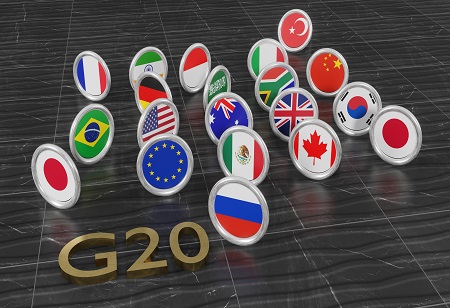
The G20 Summit, chaired by India, concluded its session in Delhi on September 10th. This meeting yielded many fruitful outcomes, mainly the admission of the African Union as a permanent member of G20 and the creation of a trade corridor from India to the Middle East aptly titled “India-Middle East-Europe Economic Corridor.” Many experts had opinions on the events that transpired, and here are a few noteworthy mentions.
India's initiatives to encourage the adoption of Digital Public Infrastructure around the world have gotten a boost with the official acceptance of the G20 Leaders' New Delhi Declaration. All G20 members have agreed to a voluntary and proposed structure for the creation, implementation, and governance of DPI. One of the important findings emphasizes how India has been embraced and supported as a pioneer in developing digital public infrastructure. The US mentioned us as competent technical partners for AI, semiconductors, supercomputing, and high-performance computing. The statement summarizes our standing on the world stage and provides access to new opportunities.
The Delhi Declaration Point #18 refers to MSMEs as engines of growth. We welcome the establishment of an Engagement group and hope it continues even after India leaves the Presidency of G20. In parallel, the Indian Government should further tighten the tracking of timely payment of invoices within 45 days as mandated by the MSMED Act. Large companies continue to blatantly flout this at will by finding reasons, then asking for a letter confirming waiver of obligation or simply seeking cancellation of the invoice and the raising of a fresh one.
In Section G related to related to Gender Equality and Empowering all women and girls, under clause 64 (iv) our Government has missed an opportunity to highlight specifically the path breathing initiative of making Creches mandatory under the Maternity Act 2017 which, if implemented in other countries, can be a game changer in ensuring early return to work and continuation of career prospects for women post child delivery.
In accordance with the initiative to create a trusted, safe and secure digital public infrastructure, businesses need to shift their focus towards data protection. Creating a secure digital ecosystem will require the right balance of transparency and protection to ensure data efficiency. To adopt data privacy, and protect intellectual property rights, businesses need to elevate their techniques and leverage the power of AI, ML with responsibility to stay ahead of the emerging threats and become part of the movement of building a safe and secure digital economy.
Emphasis on safe, secure, trusted, accountable, and inclusive digital public infrastructure in the G20 declaration reflects a commitment to responsible digital development. Prioritizing human rights, personal data protection, privacy, and intellectual property rights is essential in the digital age. This approach aims to balance technological advancements with ethical considerations, ensuring that digital infrastructure benefits society while respecting individual rights and fostering innovation.
Having already leapfrogged the Western markets in terms of payments & finance digital infrastructure, It is now India's turn to also make equally important strides in the digital infrastructure necessary to establishing smart living communities. At Cavli, we are pioneering India's semiconductor leadership with our made-in-India IoT modules & cloud solutions. We look forward to working with the country's leadership to establish an ecosystem that will enable product makers to very easily adopt & build Smart connected solutions across, not just for India, but for 'made in India phygital products to be shipped to all around the world commented Ajit Thomas, Co-founder & CMO at Cavli Wireless.
India, with its rich agricultural heritage, can harness the power of G20 leadership to shine a spotlight on the pressing challenges confronting the global agriculture and agri-food processing sector. With nearly half of our population dependent on farming, India understands the significance of a sustainable and resilient agri-food ecosystem. By leveraging our influence within the G20, we can champion initiatives that prioritize food security and technological innovation. This platform allows us to advocate for fair trade policies, equitable access to resources, and the empowerment of small-scale farmers and agri-food processors. Let us seize this opportunity to cultivate a future where agriculture not only feeds the world but also nourishes the planet and its people. Together, through G20 leadership, we can sow the seeds of positive change that will yield a bountiful harvest for generations to come.
We use cookies to ensure you get the best experience on our website. Read more...